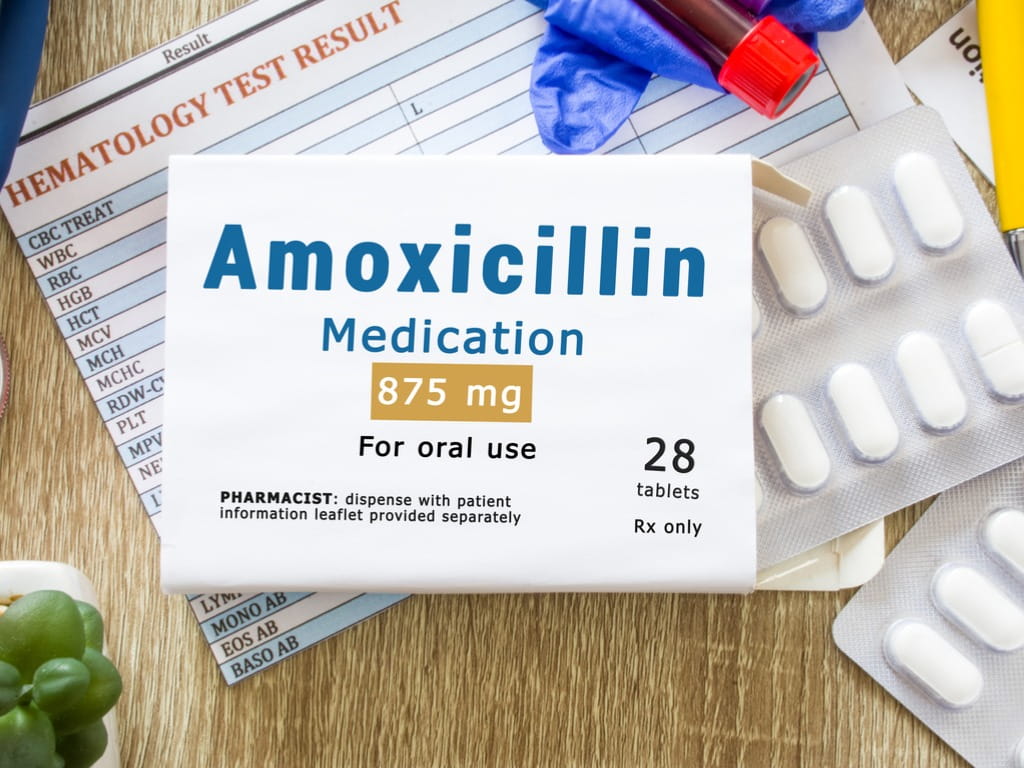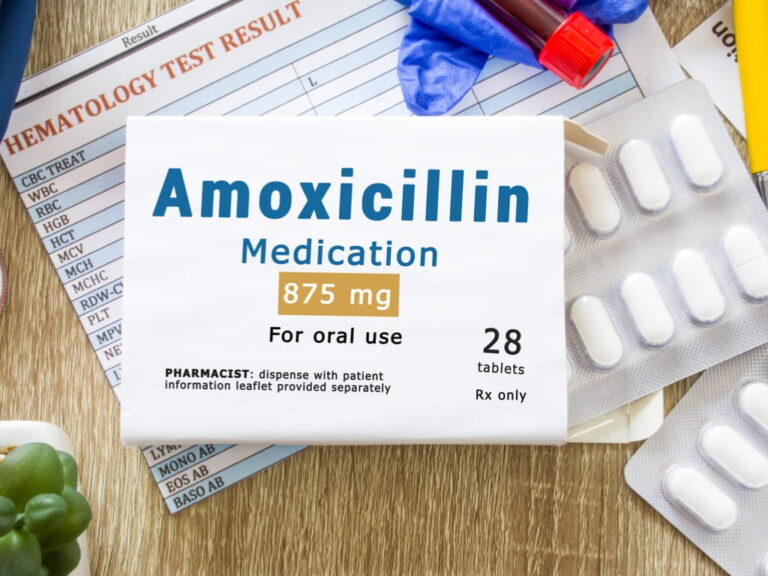
Can alcohol and amoxicillin coexist peacefully? Many people wonder whether it is safe to drink while on this antibiotic. The possible risks are covered in this article together with the necessary safety measures.
Key Takeaways
- Amoxicillin is a versatile antibiotic commonly prescribed for various bacterial infections, available in multiple forms to cater to patient needs.
- While Amoxicillin does not have significant interactions with alcohol, it is advisable to avoid alcohol consumption during treatment to support the immune system and enhance recovery.
- Drinking alcohol while taking Amoxicillin can increase side effects and reduce the medication’s effectiveness; therefore, a waiting period of 48-72 hours after completing treatment is recommended before consuming alcohol.
Table of Contents
Understanding Amoxicillin
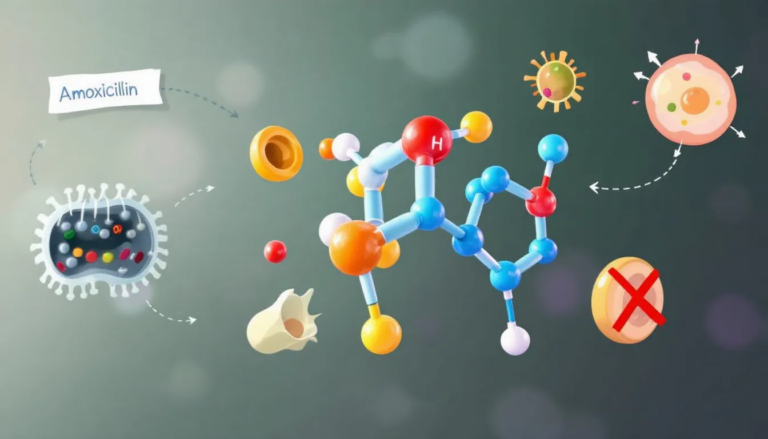
Thanks to its amino-penicillin structure, the well-known prescription antibiotic amoxicillin is quite important in treating different bacterial infections. Classed under the penicillin-like antibiotics, Amoxicillin reduces bacterial growth, so treating infections and encouraging healing.
Many times, people are prescribed Amoxicillin for off-label purposes like treating Lyme disease or preventing infections during dental work or operations in addition to for normal infections.
Common Uses
Many doctors’ first choice antibiotics are amoxicillin because of its adaptability. It is usually advised to treat a variety of bacterial diseases including those influencing:the skin
the respiratory system
the urinary tract
dental issues
the ears
For conditions including strep throat, skin infections, and dental infections, for example, Amoxicillin helps to manage them rather successfully.
Given its general use, knowing its purposes helps one to appreciate why it is such a frequently prescribed medicine.
Dosage Forms
When it comes to taking Amoxicillin, there’s flexibility in how it can be administered. The antibiotic is available in several dosage forms including capsules, tablets, chewable tablets, and liquid suspensions. Each of these forms caters to different patient needs, ensuring ease of swallowing and dosage accuracy.
Amoxicillin is available in several dosage forms, including:
Capsules
Tablets
Chewable tablets
Liquid suspensions
Each of these forms caters to different patient needs, ensuring ease of swallowing and dosage accuracy.
This variety allows healthcare providers to tailor the treatment to the patient’s preferences and medical requirements, enhancing the overall effectiveness of the antibiotic treatment.
Alcohol and Antibiotics: General Considerations

Mixing alcohol and antibiotics is generally not recommended. While most commonly prescribed antibiotics do not have significant interactions with alcohol, it’s generally wise to avoid drinking alcohol while recovering from an infection.
This advice is based on the idea that alcohol consumption can hinder the body’s ability to heal, despite not impairing Amoxicillin’s effectiveness.
Effects on Immune System
Alcohol has a notorious reputation for weakening the immune system. This weakening effect can be particularly detrimental when the body is fighting off bacterial infections, as it may allow bacteria to grow and worsen the infection. Dehydration, another side effect of alcohol, further complicates recovery by hindering the body’s natural healing processes. Therefore, healthcare providers often advise against alcohol consumption during antibiotic treatment to ensure the immune system remains robust and effective.
Avoiding alcohol while taking Amoxicillin isn’t just about preventing immediate side effects; it’s about supporting your body’s overall ability to heal. Avoiding alcohol boosts your immune system’s ability to fight infections, making the treatment more effective and speeding up your recovery.
Potential Interactions
When it comes to potential interactions, mixing alcohol with certain antibiotics can result in severe and potentially long-term side effects. While Amoxicillin belongs to the beta lactam antibiotics, which are generally safe to use with alcohol, caution is still advised. Alcohol can worsen the existing side effects of prescription medications, leading to increased dizziness and stomach upset.
Moderation is crucial if you decide to drink alcohol while taking Amoxicillin, even though it doesn’t directly interfere with the medication’s effectiveness. This caution helps prevent additional strain on the body, especially during illness when dehydration from alcohol could be particularly harmful.
Specific Risks of Mixing Amoxicillin and Alcohol

While combining alcohol and Amoxicillin typically results in no severe side effects, it can aggravate some including nausea and stomach pain. Apart from these adverse effects, alcohol consumption while on antibiotics could make it more difficult for the medication to effectively treat the infection.
Knowing these specific hazards will help you to avoid the possible consequences of alcohol consumption and make better decisions about it during your treatment.
Increased Side Effects
Drinking alcohol while on Amoxicillin can greatly aggravate or intensify the side effects connected with the medicine. Amoxicillin commonly causes nausea, vomiting, and diarrhea; alcohol intake can aggravate these side effects. Alcohol and Amoxicillin thus raise the risk of side effects, which makes the treatment process more unpleasant and maybe less successful.
Combining alcohol with some antibiotics might aggravate current side effects from medications. For those on Amoxicillin, this could mean increased nausea and stomach cramps, which not only cause discomfort but also might lead to dehydration and additional problems.
Impact on Effectiveness
Alcohol consumption can impair the body’s ability to respond to infections effectively. Increased alcohol intake can lead to dehydration, which in turn makes it more difficult for the body to recover from infections. Additionally, alcohol can slow down the absorption of Amoxicillin, thereby reducing the medication’s effectiveness.
Allergic Reactions
Combining alcohol with Amoxicillin may also increase the risk of severe allergic reactions, which require immediate medical attention if they occur. Allergic reactions to Amoxicillin can include symptoms such as rash, itching, and difficulty breathing.
Patients should be vigilant and seek medical help if they experience severe symptoms after consuming alcohol while on Amoxicillin.
Guidelines for Alcohol Consumption During Amoxicillin Treatment
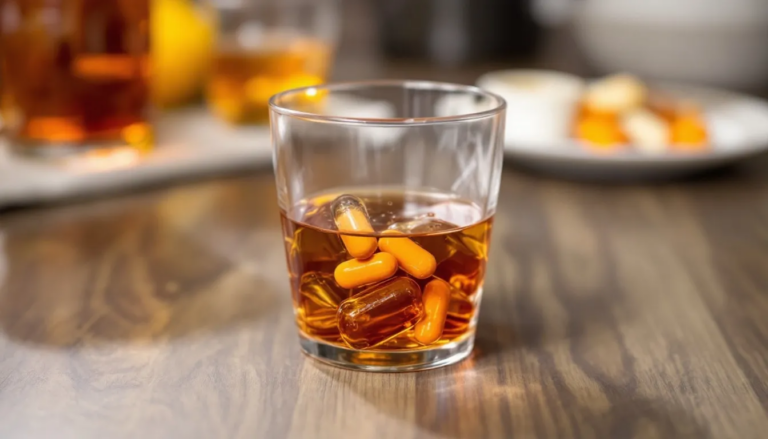
Usually advised for best healing is to avoid alcohol while on Amoxicillin. While modest alcohol intake has no direct effect on the efficacy of Amoxicillin, total avoidance can help hasten recovery and lower side effect risk. See your doctor always the best line of action if you are ever unsure about combining alcohol with Amoxicillin.
Recommended Waiting Period
Those who wish to drink alcohol should wait 48 to 72 hours following Amoxicillin dosage. This waiting time guarantees the effectiveness of the treatment and reduces side effects risk. Following this advice helps the body heal and preserves the effectiveness of the medicine.
Safe Drinking Practices
Limiting intake to modest amounts and keeping an eye on any side effects is advised in case avoiding alcohol is not a possibility. Though alcohol usually does not interact with Amoxicillin, abstaining from alcohol helps the body heal more effectively. By helping to reduce side effects like nausea and upset stomach, taking Amoxicillin with food helps make the treatment more palable.
Taking Amoxicillin Safely
Safely taking Amoxicillin calls for more than just avoiding alcohol. Typical side effects consist in nausea, vomiting, diarrhea, and headaches. To prevent possible complications, you should let your doctor know about any other drugs or medical illnesses. Speaking with your healthcare provider guarantees that your treatment is catered to your particular requirements and condition of health.
Following Prescriptions
Finishing the entire course of amoxicillin treatment is essential to prevent bacteria from becoming resistant. The recommended amoxicillin dosage varies based on age and the condition being treated. Missing doses can compromise the effectiveness of the treatment, so it’s important to stick to the prescribed schedule.
Managing Side Effects
Severe side effects of Amoxicillin may include rash, itching, hives, difficulty breathing, and swelling of the face or lips. If you experience severe reactions, stop taking the medication and contact your doctor immediately.
Adhering to the prescribed schedule and managing side effects proactively ensures a smoother treatment process.
Avoiding Drug Interactions
To guarantee the efficacy of Amoxicillin and avoid side effects, one must avoid some drugs while taking it. More than forty percent of adults have taken drugs that might interact with alcohol, which emphasizes the need of avoiding alcohol while on Amoxicillin. This measure guarantees a safe course of treatment and helps to reduce the possibility of negative interactions.
Other Antibiotics and Alcohol
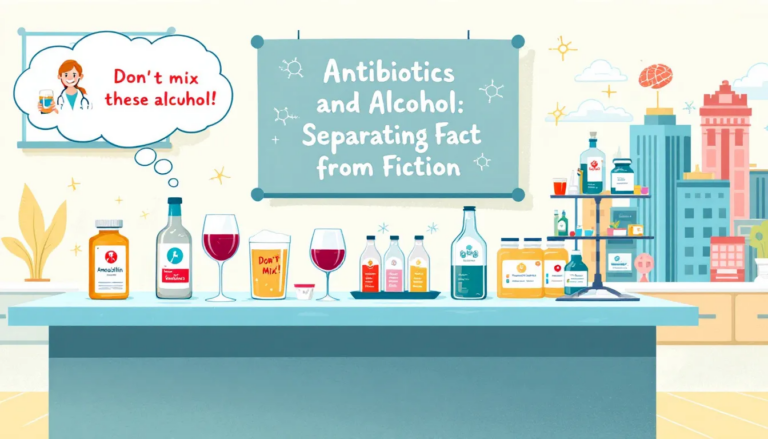
One should be aware of the interactions among other antibiotics and alcohol. This is equally important than knowledge of Amoxicillin. Severe reactions from some antibiotics, such as metronidazole and tinidazole, should prevent drinking any alcohol. Understanding these interactions guarantees a safer treatment process and helps one to avoid negative side effects.
Beta Lactam Antibiotics
Beta lactam antibiotics, including Amoxicillin, generally have minimal antibiotic interactions with alcohol. No known interactions exist between alcohol and beta lactam antibiotics, making them relatively safe to use even if alcohol is consumed.
However, it’s still advisable to avoid alcohol to support the body’s recovery from bacterial infections.
Macrolides and Alcohol
Commonly used for respiratory problems, macrolides could have changed pharmacokinetics if alcohol is drank concurrently. Alcohol can greatly lower the efficacy of macrolides, which results in either extended infections or treatment failures. To guarantee best treatment results, it is thus usually advised to avoid alcohol while on macrolide antibiotics.
Fluoroquinolones and Alcohol
Though ciprofloxacin and other fluoroquinolone antibiotics have little effect on alcohol, moderation is advised during treatment. Common antibiotics for various bacterial infections are these ones; thus, good treatment depends on keeping a balance. Although alcohol does not specifically interact with these antibiotics, avoiding alcohol will help the body not be under extra burden during recovery.
Summary
While moderate alcohol consumption does not directly interfere with Amoxicillin, it’s generally advisable to avoid alcohol to support the body’s recovery. Understanding the risks and guidelines for mixing Amoxicillin and alcohol can help you manage your treatment more effectively. Always consult your healthcare provider for personalized advice and follow their recommendations to ensure a safe and successful recovery.
Frequently Asked Questions
Can I drink alcohol while taking Amoxicillin?
It is advisable to avoid alcohol while taking Amoxicillin, as it may increase the risk of side effects such as nausea and stomach upset. Prioritizing your recovery is important.
How long should I wait to drink alcohol after finishing Amoxicillin?
It is advisable to wait 48-72 hours after completing your course of Amoxicillin before consuming alcohol. This precaution helps reduce the risk of side effects and ensures the treatment’s effectiveness.
What are the common side effects of Amoxicillin?
Common side effects of Amoxicillin are nausea, vomiting, diarrhea, upset stomach, and headaches. It is important to seek medical attention if severe side effects like rash, difficulty breathing, or swelling occur.
Are there any antibiotics that should never be mixed with alcohol?
Certain antibiotics, particularly metronidazole and tinidazole, should never be mixed with alcohol due to the risk of severe reactions. It is essential to consult your healthcare provider regarding any potential interactions with your medications.
What should I do if I experience severe side effects while taking Amoxicillin?
If you experience severe side effects like rash, difficulty breathing, or swelling, discontinue Amoxicillin immediately and consult your healthcare provider for further assistance.
Dr. Mitchell G. Cohen is a board-certified Internal Medicine specialist with over 34 years of experience in patient-centered healthcare. A graduate of Hahnemann University School of Medicine, Dr. Cohen completed his internship at the University Health Center of Pittsburgh, where he gained invaluable hands-on experience. He is also a certified addiction specialist, holding membership with the American Society of Addiction Medicine (ASAM).
Currently based in Nashua, NH, Dr. Cohen is affiliated with Saint Joseph Hospital, where he provides comprehensive care focusing on both internal medicine and addiction treatment. His expertise includes prevention, diagnosis, and management of adult diseases, as well as specialized care for individuals facing substance use disorders.
Dr. Cohen is committed to fostering open communication, ensuring his patients are fully informed and empowered to make confident decisions about their health and treatment options.

MD Mitchell Grant Cohen
Dr. Mitchell G. Cohen is a board-certified Internal Medicine specialist with over 34 years of experience in patient-centered healthcare. A graduate of Hahnemann University School of Medicine, Dr. Cohen completed his internship at the University Health Center of Pittsburgh, where he gained invaluable hands-on experience. He is also a certified addiction specialist, holding membership with the American Society of Addiction Medicine (ASAM).
Currently based in Nashua, NH, Dr. Cohen is affiliated with Saint Joseph Hospital, where he provides comprehensive care focusing on both internal medicine and addiction treatment. His expertise includes prevention, diagnosis, and management of adult diseases, as well as specialized care for individuals facing substance use disorders.
Dr. Cohen is committed to fostering open communication, ensuring his patients are fully informed and empowered to make confident decisions about their health and treatment options.
